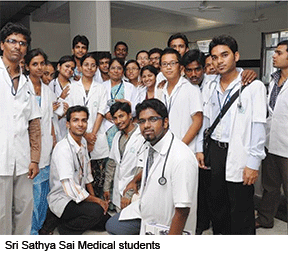An August 6 judgement of the Madras high court summarily dismissing serious charges filed by the Central Bureau of Investigation (CBI) against a Chennai-based private medical college accused of illegally collecting capitation fees, and four private medical colleges for fraudulently presenting impersonators as faculty members during inspection by a Medical Council of India (MCI) team, has shocked and outraged educationists, lawyers and the general public in Tamil Nadu.
In a speedily delivered judgement, the court dismissed a CBI revision petition challenging the discharge of administrators of Shri Sathya Sai Medical College and Research Institute and Melmaruvathur Adhi Parasakthi Institute of Medical Sciences (earlier discharged by a trial court) and quashed charges against the Sri Lakshmi Narayana Institute of Medical Sciences. All three institutions were accused of forging documents and presenting impersonators not on their faculty payrolls before an MCI inspection team in April 2010 to secure or renew recognition of their colleges. Consequently they were charged under Section 420 (cheating), 463 (forgery) and 120-B (conspiracy) of the Indian Penal Code, 1860.
Delivering the high court’s judgement, Justice Aruna Jagadeesan said that the MCI Act, 1956 does not prescribe penal consequences for violation of its provisions, and ruled that faculty shortfalls and submission of false declaration forms were not punishable offences under the provisions of IPC or the Prevention of Corruption Act (PCA), 1988.
“Contravention of rules may be an offence against the statute but is not a crime. There is no room or jurisdiction for any external agency (like the CBI) to investigate the affairs of a medical institution coming within the purview of the Medical Council of India,” she ruled stressing the point that the MCI Act was a self-contained law with provisions to punish misconduct by doctors and medical institutions. Therefore it was improper for the CBI to file criminal charges against violators.
 The speed and pedantic reasoning with which the high court dismissed charges against the four medical colleges has stunned judicial circles in the state. “By taking away the CBI’s jurisdiction, the high court has given unfettered powers to MCI. Although every regulatory and statutory body has its own rules and regulations, they cannot be outside the purview of the CBI,” said a veteran prosecutor quoted by the Times of India (August 9).
The speed and pedantic reasoning with which the high court dismissed charges against the four medical colleges has stunned judicial circles in the state. “By taking away the CBI’s jurisdiction, the high court has given unfettered powers to MCI. Although every regulatory and statutory body has its own rules and regulations, they cannot be outside the purview of the CBI,” said a veteran prosecutor quoted by the Times of India (August 9).
The high court verdict highlights how badly drafted legislation, casual enforcement and cavalier judicial interpretation have allowed scams and scandals in medical education to grow and multiply. Despite the Tamil Nadu Educational Institutions (Prohibition of Collection of Capitation Fee) Act, 1992 and two Supreme court verdicts in the T.M.A Pai Foundation Case (2002) and P.A Inamdar vs. State of Maharashtra (2005) specifically prohibiting the levy of admission or capitation fees by professional education institutions, the state’s 22 private medical college managements routinely extract huge capitation fees under the management quota. To date not a single college or official thereof has been convicted for breaching this law.
According to educationists in Chennai, the dubious practice of hastily mobilising faculty and equipment from other medical colleges and hospitals in time for MCI inspections, has been prevalent for several years in government and private medical colleges due to grossly inadequate faculty and lack of mandatory equipment in many of the state’s 41 medical education institutions. But despite severe criticism from the public and media, the state government and private medical college managements have not taken sufficient steps to eliminate such duplicity.
“Neither the state government nor the MCI is interested in eradicating the malpractices of government and private medical colleges. Moreover, the MCI itself is a corrupt body and cannot be relied upon to take corrective action,” says Prof. E. Balaguruswamy, former vice chancellor of Anna University and currently chairman of EBG Foundation, Coimbatore.
At the root of the capitation fee scourge in medical education in Tamil Nadu is a huge demand-supply gap, with demand for medical education far outstripping supply. In Tamil Nadu, 19 government medical colleges offer 2,172 highly-subsidised MBBS seats, and 22 private medical colleges 2,810 seats annually. Moreover 12 private medical colleges surrender 50 percent of their seats which are added to the government quota.
To compound the problems of private medical colleges, the state government insists that they adhere to tuition fees (ranging from Rs.2.25-3.25 lakh per year) prescribed by a government appointed fee fixation committee. According to private medical colleges, these fees are grossly inadequate to meet the actual costs of medical education estimated by MCI itself at Rs.4.5 lakh per year. Therefore they feel justified in levying capitation fees on students admitted under the 50 percent management quota.
Undoubtedly, excessive regulation of private medical colleges and the MCI’s non-transparent licensing and regulatory systems have multiplied malpractices in Tamil Nadu’s 41 medical colleges. But by allowing administrators of medical colleges indulging in brazen criminal misconduct to get away scot free, the Madras high court seems to have made a messy system messier.
Hemalatha Raghupathi (Chennai)